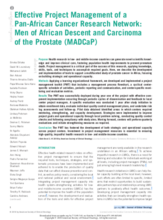
Abstract
PURPOSE:
Health research in low- and middle-income countries can generate novel scientific knowledge and improve clinical care, fostering population health improvements to prevent premature death. Project management is a critical part of the success of this research, applying knowledge, skills, tools, and techniques to accomplish required goals. Here, we describe the development and implementation of tools to support a multifaceted study of prostate cancer in Africa, focusing on building strategic and operational capacity.
METHODS:
Applying a learning organizational framework, we developed and implemented a project management toolkit (PMT) that includes a management process flowchart, a cyclical center-specific schedule of activities, periodic reporting and communication, and center-specific monitoring and evaluation metrics.
RESULTS:
The PMT was successfully deployed during year one of the project with effective component implementation occurring through periodic cycles of dissemination and feedback to local center project managers. A specific evaluation was conducted 1 year after study initiation to obtain enrollment data, evaluate individual quality control management plans, and undertake risk log assessments and follow-up. Pilot data obtained identified areas in which centers required mentoring, strengthening, and capacity development. Strategies were implemented to improve project goals and operational capacity through local problem solving, conducting quality control checks and following compliancy with study aims. Moving forward, centers will perform quarterly evaluations and initiate strengthening measures as required.
CONCLUSION:
The PMT has fostered the development of both strategic and operational capacity across project centers. Investment in project management resources is essential to ensuring high-quality, impactful health research in low- and middle-income countries.
